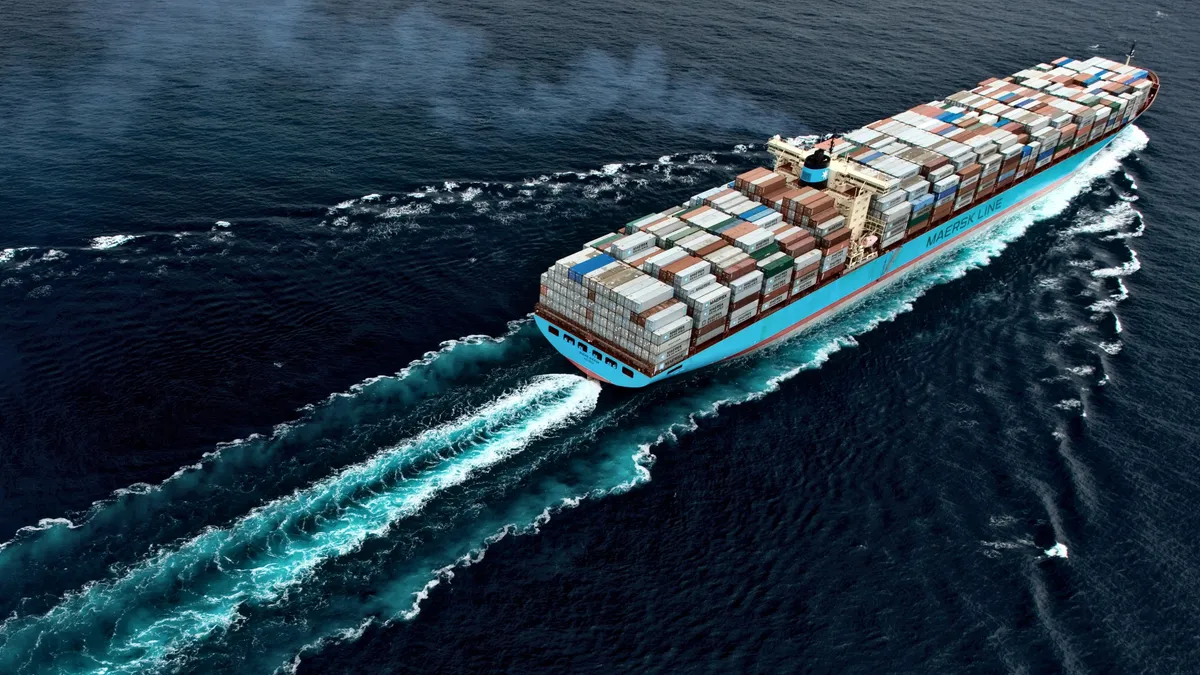In front of thousands of shippers, carriers, freight forwarders and analysts in the ocean shipping industry, Maersk CEO Søren Skou proudly made a promise this past March.
The carrier would offer instant booking and confirmation on (almost) all cargo shipments by mid-2019, Skou proclaimed at JOC's TPM conference in Long Beach, California.
"I expect other carriers to follow suit," the Danish carrier's CEO said.
Skou's definitive tone reflected Maersk's reputation as the big fish in container shipping, defining the future of the industry with every move. Experts use words such as "pioneer," "leader," "forefront" and "visionary" to describe Skou and Maersk.
From end-to-end, customer-service oriented solutions to accelerated digital transformations in a historically slow-moving industry, Skou has been a wave-making force in ocean freight. This year, the seeds he's planted are beginning to bear fruit, as carriers join Maersk's blockchain platform and end-to-end services become industry standard. For this reason, Skou has earned Supply Chain Dive's award for 2019 Executive of the Year.
It's all about the customer
Graham Parker, CEO of Kontainers, described Skou as a hands-on leader and someone who saw the benefits of digitization and end-to-end services early on. "They're all in on becoming an integrated provider of logistics," Parker told Supply Chain Dive.
This year, Maersk acquired brokerage company Vandegrift and later added digital customs clearance to its portfolio. It also invested in inland logistics services.

"This direction starts at the top with Søren Skou, and permeates all aspects of the business," Andrew Sisto, senior product manager at project44 and former Maersk and Damco employee, told Supply Chain Dive in an email.
Since Skou came on as head honcho at Maersk, he's drilled down into the Danish giant's business model, spinning off businesses tangential to supply chain and shipper services while adding and acquiring divisions for a customer-centric model.
Skou brought digital transformation up from the IT function to the C-suite, making digital advancements a central tenet of the business, Philippe Salles, Drewry's head of e-business, transport and supply chain, told Supply Chain Dive.
The digital journey
Many of Maersk's customer-oriented solutions are also digital ones, including instant quoting and digital booking — which enhance transparency for shippers and seek to eliminate problematic rolled cargo — and traceability solutions for cargo and reefers.
"Digital is in Maersk's DNA," Parker said. He added Maersk is far ahead of competitors because of the pace at which the Danish carrier builds, tests and iterates its technology platforms.
The container line's blockchain efforts started in earnest last year with the formation of TradeLens with IBM and accelerated this year as carriers jumped on board the platform.
Indirectly, the blockchain efforts also moved forward with the formation of the Digital Container Shipping Association (DCSA) this April, an agreement to develop digital standards in ocean freight along with Hapag-Lloyd, MSC and ONE, and later CMA CGM.
A sea change in ocean freight
As the largest container line in the world and a pioneer in the industry, Maersk has set the bar for transformation among major carriers.
"They are all working toward the same direction of improving the customer experience," Salles said. He added the adoption of customer-oriented solutions was not just to compete with Maersk, but because carriers saw "the value in doing the same." After significant consolidation among carriers, they could no longer strengthen the business through M&A, so instead, they turned to solutions to improve shipper experiences, Salles said.
"Digital is in Maersk's DNA."

Graham Parker
CEO, Kontainers
Similarly, Maersk prompted an interest in digital transformation in an industry that has held onto its legacy systems. "The appetite [for digital] among all the incumbents has increased massively over the last 5 years," Xeneta CEO Patrik Berglund told Supply Chain Dive in an email.
Salles and Parker emphasized Maersk is not always first or best in class when it comes to digital. Salles gave the example of electronic bills of lading, on which he said CMA CGM is at the forefront. And Hapag-Lloyd was among the first carriers to provide instant quotes, offering it before Maersk.
Parker sees the next step in digital transformation — for all major container lines, not just Maersk — as moving to a model similar to passenger airlines, where prices change by the minute in line with demand.
"Dynamic pricing is the holy grail of the next decade," he said.




 Read more
Read more









